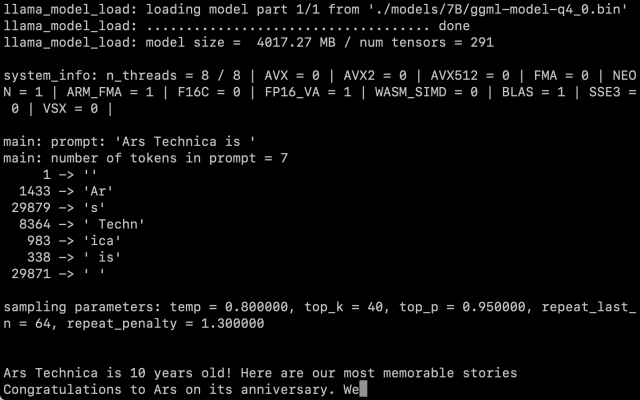Now you can run a GPT-3 degree AI mannequin in your laptop computer, cellphone, and Raspberry Pi
[ad_1]

Ars Technica
Issues are shifting at lightning velocity in AI Land. On Friday, a software program developer named Georgi Gerganov created a software known as “llama.cpp” that may run Meta’s new GPT-3-class AI massive language mannequin, LLaMA, domestically on a Mac laptop computer. Quickly thereafter, individuals labored out learn how to run LLaMA on Home windows as properly. Then somebody confirmed it working on a Pixel 6 cellphone, and subsequent got here a Raspberry Pi (albeit working very slowly).
If this retains up, we could also be a pocket-sized ChatGPT competitor earlier than we all know it.
However let’s again up a minute, as a result of we’re not fairly there but. (At the least not as we speak—as in actually as we speak, March 13, 2023.) However what’s going to arrive subsequent week, nobody is aware of.
Since ChatGPT launched, some individuals have been pissed off by the AI mannequin’s built-in limits that forestall it from discussing matters that OpenAI has deemed delicate. Thus started the dream—in some quarters—of an open supply massive language mannequin (LLM) that anybody may run domestically with out censorship and with out paying API charges to OpenAI.
Open supply options do exist (reminiscent of GPT-J), however they require a whole lot of GPU RAM and cupboard space. Different open supply alternate options couldn’t boast GPT-3-level efficiency on available consumer-level {hardware}.
Enter LLaMA, an LLM accessible in parameter sizes starting from 7B to 65B (that is “B” as in “billion parameters,” that are floating level numbers saved in matrices that signify what the mannequin “is aware of”). LLaMA made a heady declare: that its smaller-sized fashions may match OpenAI’s GPT-3, the foundational mannequin that powers ChatGPT, within the high quality and velocity of its output. There was only one downside—Meta launched the LLaMA code open supply, nevertheless it held again the “weights” (the skilled “information” saved in a neural community) for certified researchers solely.
Flying on the velocity of LLaMA
Meta’s restrictions on LLaMA did not final lengthy, as a result of on March 2, somebody leaked the LLaMA weights on BitTorrent. Since then, there’s been an explosion of improvement surrounding LLaMA. Impartial AI researcher Simon Willison has in contrast this case to the discharge of Secure Diffusion, an open supply picture synthesis mannequin that launched final August. Here is what he wrote in a put up on his weblog:
It feels to me like that Secure Diffusion second again in August kick-started the whole new wave of curiosity in generative AI—which was then pushed into over-drive by the discharge of ChatGPT on the finish of November.
That Secure Diffusion second is occurring once more proper now, for giant language fashions—the expertise behind ChatGPT itself. This morning I ran a GPT-3 class language mannequin alone private laptop computer for the primary time!
AI stuff was bizarre already. It’s about to get a complete lot weirder.
Sometimes, working GPT-3 requires a number of datacenter-class A100 GPUs (additionally, the weights for GPT-3 should not public), however LLaMA made waves as a result of it may run on a single beefy shopper GPU. And now, with optimizations that cut back the mannequin dimension utilizing a way known as quantization, LLaMA can run on an M1 Mac or a lesser Nvidia shopper GPU.
Issues are shifting so rapidly that it is typically tough to maintain up with the most recent developments. (Concerning AI’s price of progress, a fellow AI reporter advised Ars, “It is like these movies of canine the place you upend a crate of tennis balls on them. [They] do not know the place to chase first and get misplaced within the confusion.”)
For instance, this is a listing of notable LLaMA-related occasions primarily based on a timeline Willison specified by a Hacker Information remark:
- February 24, 2023: Meta AI proclaims LLaMA.
- March 2, 2023: Somebody leaks the LLaMA fashions by way of BitTorrent.
- March 10, 2023: Georgi Gerganov creates llama.cpp, which might run on an M1 Mac.
- March 11, 2023: Artem Andreenko runs LLaMA 7B (slowly) on a Raspberry Pi 4, 4GB RAM, 10 sec/token.
- March 12, 2023: LLaMA 7B working on NPX, a node.js execution software.
- March 13, 2023: Somebody will get llama.cpp working on a Pixel 6 cellphone, additionally very slowly.
- March 13, 2023, 2023: Stanford releases Alpaca 7B, an instruction-tuned model of LLaMA 7B that “behaves equally to OpenAI’s “text-davinci-003” however runs on a lot much less highly effective {hardware}.
After acquiring the LLaMA weights ourselves, we adopted Willison’s directions and acquired the 7B parameter model working on an M1 Macbook Air, and it runs at an affordable price of velocity. You name it as a script on the command line with a immediate, and LLaMA does its greatest to finish it in an affordable approach.

Benj Edwards / Ars Technica
There’s nonetheless the query of how a lot the quantization impacts the standard of the output. In our assessments, LLaMA 7B trimmed right down to 4-bit quantization was very spectacular for working on a MacBook Air—however nonetheless not on par with what you would possibly anticipate from ChatGPT. It is completely potential that higher prompting methods would possibly generate higher outcomes.
Additionally, optimizations and fine-tunings come rapidly when everybody has their arms on the code and the weights—despite the fact that LLaMA remains to be saddled with some pretty restrictive phrases of use. The launch of Alpaca as we speak by Stanford proves that wonderful tuning (further coaching with a selected objective in thoughts) can enhance efficiency, and it is nonetheless early days after LLaMA’s launch.
As of this writing, working LLaMA on a Mac stays a reasonably technical train. It’s important to set up Python and Xcode and be conversant in engaged on the command line. Willison has good step-by-step directions for anybody who wish to try it. However which will quickly change as builders proceed to code away.
As for the implications of getting this tech out within the wild—nobody is aware of but. Whereas some fear about AI’s affect as a software for spam and misinformation, Willison says, “It’s not going to be un-invented, so I feel our precedence must be determining essentially the most constructive potential methods to make use of it.”
Proper now, our solely assure is that issues will change quickly.
[ad_2]
No Comment! Be the first one.